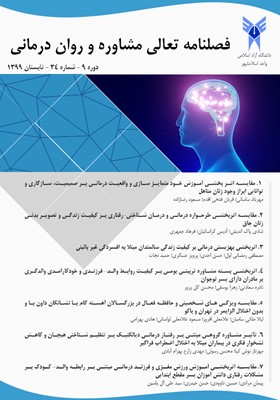اثربخشی بسته مشاوره تربیتی بومی بر کیفیت روابط والد- فرزندی و خودکارآمدی والدگری بر مادران دارای پسر نوجوان
محورهای موضوعی : فصلنامه تعالی مشاوره و روان درمانینادره سعادتی 1 , زهرا یوسفی 2 * , محسن گل پرور 3
1 - دانشجوی دکتری مشاوره، گروه مشاوره، واحد اصفهان (خوراسگان)، دانشگاه آزاد اسلامی، اصفهان، ایران
2 - استادیار گروه روانشناسی، دانشکده روانشناسی و علوم تربیتی، واحد اصفهان (خوراسگان)، دانشگاه آزاد اسلامی، اصفهان، ایران
3 - دانشیار گروه روانشناسی، دانشکده روانشناسی و علوم تربیتی، واحد اصفهان (خوراسگان)، دانشگاه آزاد اسلامی، اصفهان، ایران
کلید واژه: خودکارآمدی والدگری, مشاوره تربیتی, کیفیت رابطه والد-فرزندی,
چکیده مقاله :
هدف: هدف پژوهش تعیین اثربخشی آموزش بسته تربیتی بومی بر کیفیت روابط والد-فرزندی و خودکارامدی والدگری بر مادران دارای پسر نوجوان بود. روش: روش پژوهش از نوع نیمه آزمایشی، پیش آزمون-پسآزمون و پیگیری دو ماهه با گروههای آزمایش و گواه بود. جامعه آماری پژوهش مادران دارای نوجوان پسر 12 تا 18 سال شهر اصفهان در سال 1398 به تعداد 78 نفر بودند که از بین آنها 40 مادر که روابط والد-فرزندی و خودکارآمدی والدگری پایینتری داشتند به روش هدفمند انتخاب و بهصورت تصادفی در دو گروه مساوی جایگزین شدند. گروه آزمایش به مدت 8 جلسه 90 دقیقهای بسته مشاوره تربیتی بومی (محقق ساخته) را دریافت کردند و گروه گواه در طول پژوهش هیچ مداخله ای را دریافت نکردند. شرکتکنندگان هر دو گروه پرسشنامه رابطه والد-فرزندی پیانتا (1994) و خودکارآمدی والدگری دومکا و همکاران (1996) را در سه مرحله تکمیل کردند. داده ها با روش تحلیل واریانس با اندازه گیری مکرر در نرم افزار SPSS نسخه 24 تحلیل شدند. یافته ها: نتایج حاکی از تأثیر برنامه بسته مشاوره تربیتی بومی بر افزایش رابطه والد-فرزندی (003/0 =P) و خودکارآمدی والدگری مثبت (024/0 =P) و کاهش خودکارآمدی والدگری منفی (033/0 =P) در مرحله پس آزمون و پایداری این تأثیر در مرحله پیگیری بود. نتیجه گیری: نتایج پژوهش شواهدی را پیشنهاد میکند که آموزش این برنامه برای پیشگیری و اصلاح روابط هر یک از والدین با پسران نوجوان خود موجب کاهش خودکارآمدی والدگری منفی و بهبود رابطه والد- فرزندی شده تا کمتر شاهد تعارض بین والدین و پسران نوجوان جامعه باشیم؛ این پژوهش میتواند برای رواندرمانگران و مشاوران در حوزه مشاوره نوجوان و انتخاب نوع مداخله برای آموزش به والدین مفید باشد.
Purpose:The aim of this study was to determine the effectiveness of indigenous education package training on the quality of parent-child relationships and parenting self-efficacy of mothers with adolescent boys. Methodology: The research method was quasi-experimental, pre-test-post-test and two-month follow-up with experimental and control groups. The statistical population of the study was mothers with adolescent boys aged 12 to 18 years in Isfahan in 2019, of which 87 mothers with lower parent-child relationships and parenting self-efficacy through Pianta (1994) parent-child relationship questionnaire, Parental self-efficacy Dumka, Strezinger, Jackson, and Rosa (1996) were screened for self-efficacy. Finally, 40 mothers were selected and randomly assigned to the experimental group (20 mothers) and the control group (20 mothers). Participants in both groups completed parent-child relationship questionnaires and parental self-efficacy in three stages. The experimental group received a native 90-minute training package (researcher-made) for 8 sessions. Data were analyzed by repeated measures analysis of variance in SPSS software version 24. Findings: The results indicate the effect of the Indigenous Educational Counseling package on the score of the parent-child relationship (P = 0.003) with the effect size of 0.21, positive parenting self-efficacy (P = 0.024) with the effect size of 0.12, negative parenting self-efficacy (P = 0.033) with an effect size of 0.11 in the post-test stage and the stability of this effect was in the follow-up stage. Conclusions: The results of the study suggest evidence that training this program to prevent and improve the relationship of each parent with their adolescent sons reduces negative parenting self-efficacy and improves the parent-child relationship so that we see less conflict between parents and adolescent boys in society; This research can be useful for psychotherapists and counselors in the field of adolescent counseling and choosing the type of intervention to educate parents.
_||_

